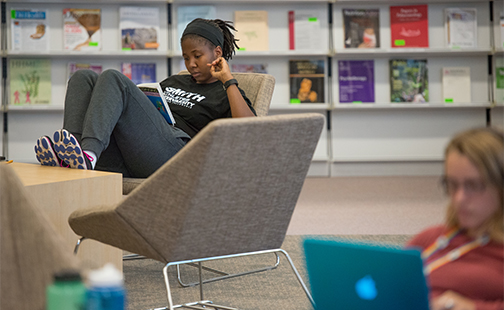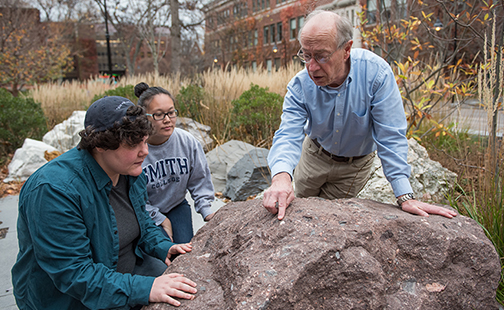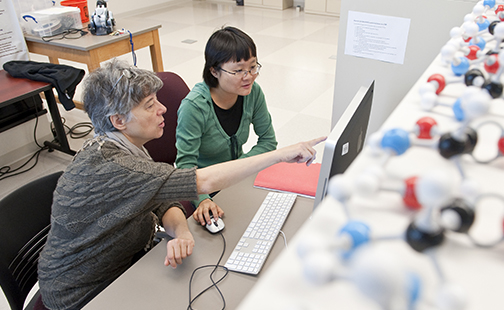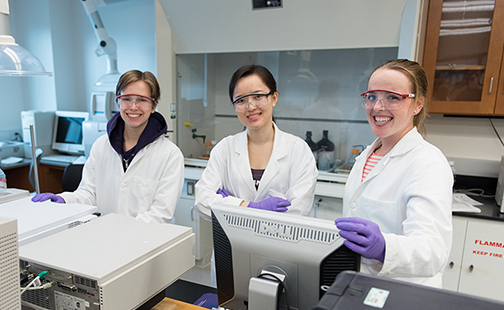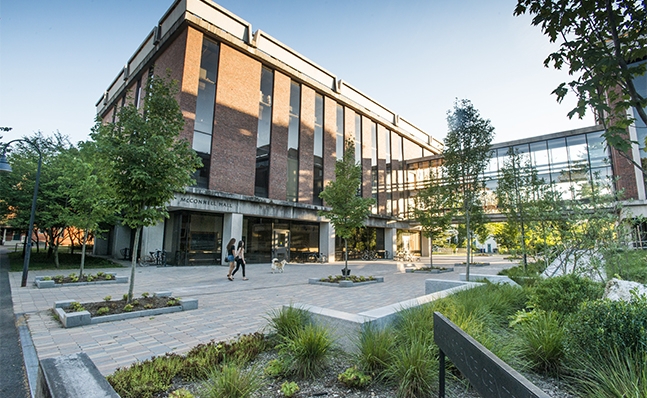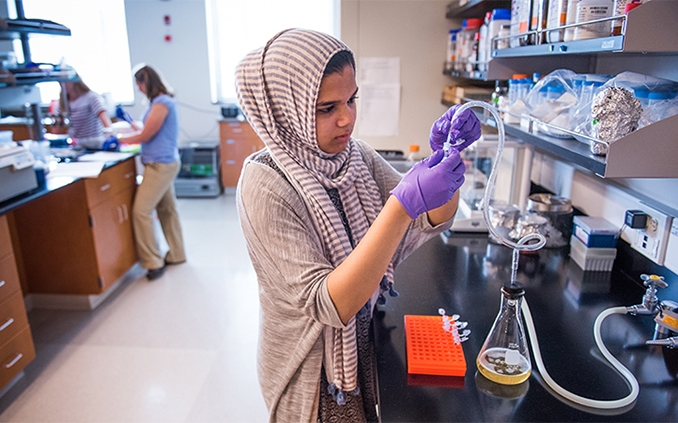STEM at Smith

Nearly half of all degrees awarded to Smith College students are in science, technology, engineering and math (STEM)–compared to 42% of women graduates nationally. At the heart of Smith’s learning is active engagement, coupling innovative teaching with real opportunities for in-depth research. Journey inside the human mind, along the edges of volcanic craters or out among the stars and galaxies. Engage in the blossoming fields of statistics, operations research, biomathematics and information science.
Why Study STEM at Smith?
Explore Programs in STEM
STEM Majors & Minors at Smith
An * indicates that the college offers a minor only (no major) in that particular course of study. A ** indicates a major only.
STEM Concentrations
Concentrations give students a way to delve further into an area of interest by combining academic and practical experiences, such as research, internships and service learning.
Below are research labs that provided information for listing here:
Elisabeth Armstrong (SWG) | Transnational women’s movement with an emphasis on rural women
Shannon Audley (EDC) | Understanding how schools, teachers, and students reinforce justice and injustice
Carrie Baker (AMS/SWG) | Writing, researching, and editing projects for Ms. magazine.
Michael Barresi (BIO/NSC) | Lab Website | Developmental biology, neurogenesis, neuron-glia interactions
Reid Bertone-Johnson (LSS) | Lab Website | Parks, bicycles, bikes, alternative transportation, pop-up, tactical urbanism, urban design, Northampton
Nalini Bhushan (PHI); Jay L. Garfield (PHI/LOG) | Translation of K.C. Bhattacharya’s Subject as Freedom
David Bickar (CHM/NSC/BCH) | Protein structure, neurochemistry, Parkinson’s Disease
Joshua Birk (HST) | Project-focused approach to working with medieval material
Maleka Donaldson (EDC) | How teachers and students respond to mistakes in educational contexts
Dawn Fulton (FRN) | Antiracist activism in France with a focus on social media
Leslie-Ann Giddings (CHM/BCH) | Lab Website | Natural products chemistry, biosynthesis, enzymology, metagenomics, extreme environments, bioactive secondary metabolites
Christophe Golé (MTH) | Plant math research: building models of phyllotaxis, collecting and analyzing plant data patterns, outreach
Alicia Grubb (CSC/SDS) | Personal Website | Requirements and software engineering, ethics, decision support
Andrew Guswa (EGR) | Hydrology, water, water resources, mathematical modeling
Mary Harrington (NSC/PSY) | Lab Website | Circadian rhythms, light
Virginia Hayssen (BIO/NSC) | Evolution of mammalian reproduction, pleiotropy, species descriptions
Nick Howe (CSC) | CS page | Research | Handwriting recognition, document analysis, computer vision, machine learning, digital humanities
Laura Katz (BIO) | Lab Website | Genome evolution and biodiversity of eukaryotic microbes, bioinformatics
Leslie King (SOC) | Environmental sustainability in the corporate sector
Katherine Kinnaird (CSC/SDS) | Personal Website | Music information retrieval, machine learning, cultural analytics, data science education
Courtney Lannert (PHY) | Computational physics, condensed matter, quantum physics, atomic physics
Jack Loveless (GEO) | Lab Website | Earthquakes, plate tectonics, natural disasters
Lisa Mangiamele (BIO/NSC) | Lab Website | Animal behavior, physiology, evolution of the nervous system
Brianna McMillan (PSY) | Lab Website | Cognitive development, language learning, infancy
Rick Millington (ENG); Sam Intrator (EDC) | Evolution of settlement houses from their founding to contemporary versions
Sara Newland (GOV) | Lab Website | East Asian politics, local governance in Taiwan, subnational diplomacy, research and teaching on Chinese politics
Sara Pruss (GEO) | Lab Website | Earth history, geobiology, ancient life and environments, paleontology
Joseph O'Rourke (CSC/MTH) | CS Page | Computational geometry, philosophy of artificial intelligence, primarily academic-year research
Joyce Palmer-Fortune (PHY) | Thin films, electron microscopy, microstructure
Stylianos Scordilis (BCH/BIO) | Molecular physiology of exercise, sexual dimorphism of skeletal muscle and myogenesis
Ileana Streinu (CSC/MTH) | CS Page | Lab Website | Computational geometry, algorithms, rigidity theory, kinematics and robotics with applications in computational biology (biomolecular/protein flexibility and motion), materials (metamaterials), and crystallography
Argyris Tsiaras (ECO) | Financial portfolio allocation, household finance, and economic inequality
Will Williams (PHY) | Lab Website | Atomic physics, spectroscopy, testing fundamental theories
Sarah Witkowski (ESS) | Lab Website | Cardiovascular disease risk, physical activity, menopause, female-identifying populations, race and ethnicity
Rachel Wright (BIO) | Lab Website | Genomics, adaptation, stress response, climate change, coral reef, anemones, symbiosis
Mariyana Zapryanova (ECO) | Economics of crime and the criminal justice system
Faculty who work with student researchers can fill in their lab information here or email Brianna McMillan. This list is not yet complete!
Graduate Study at Smith
Programs at the Five Colleges
Clark Science Center
Five buildings form a vibrant hub for STEM at Smith—Ford, Burton, Sabin-Reed, McConnell and Bass halls. They offer state-of-the-art equipment that meets exacting standards for modern experimentation.
About the Clark Science Center
STEM Advising & Mentoring
Generations of pioneering women have studied STEM at Smith and have gone on to rewarding careers in medicine, engineering, environmental consulting, public policy, applied research and more. A major in science, technology, engineering or mathematics at Smith opens doors to a variety of graduate school and career options. Smith faculty and advisers at the Lazarus Center for Career Development can provide guidance and resources to help you explore professional opportunities, whether you are poised to graduate or are just beginning your college experience.
Research Centers & Resources
Center for Aqueous Biogeochemical Research
This interdepartmental research center explores the chemistry of geological and biological actions upon the hydrosphere.
View moreCenter for Microscopy & Imaging
The CMI maintains and provides access to multiple light and electron microscopes.
View moreCenter for Proteomics
The center provides equipment for preparative and analytical experimentation with biopolymers and small(er) organic molecules.
View moreSpatial Analysis Lab
The Spatial Analysis Lab explores spatial patterns and processes through the use of Geographic Information Systems (GIS) and related technologies.
View moreCenter for Design & Fabrication
The design center provides equipment for machining, welding, fabrication, woodworking and rapid prototyping.
View moreSpinelli Center for Quantitative Learning
The Spinelli Center supports students doing quantitative work across the curriculum.
View moreCenter for Environment, Ecological Design & Sustainability
CEEDS facilitates academic and applied experiences in support of the environment.
View moreThe Botanic Garden of Smith College
Students engage in botanical and horticultural research through Smith’s STRIDE program, internships and a variety of classes.
View moreThe Nature of Inquiry: Student Research at Smith
Smith offers many unique research opportunities to undergraduates in most academic disciplines, from the sciences to the humanities and the arts. The ways in which students can conduct research, beginning even in their first year, varies from assisting faculty with their research endeavors to participating in the Summer Research Fellows Program to initiating their own projects of inquiry.
Contact
Smith College
44 College Lane
Northampton, MA 01063
Fax: 413-585-3786
Faculty Director: Kevin Shea
413-585-3801
Administrative Director: Tom Richardson
413-585-3802

